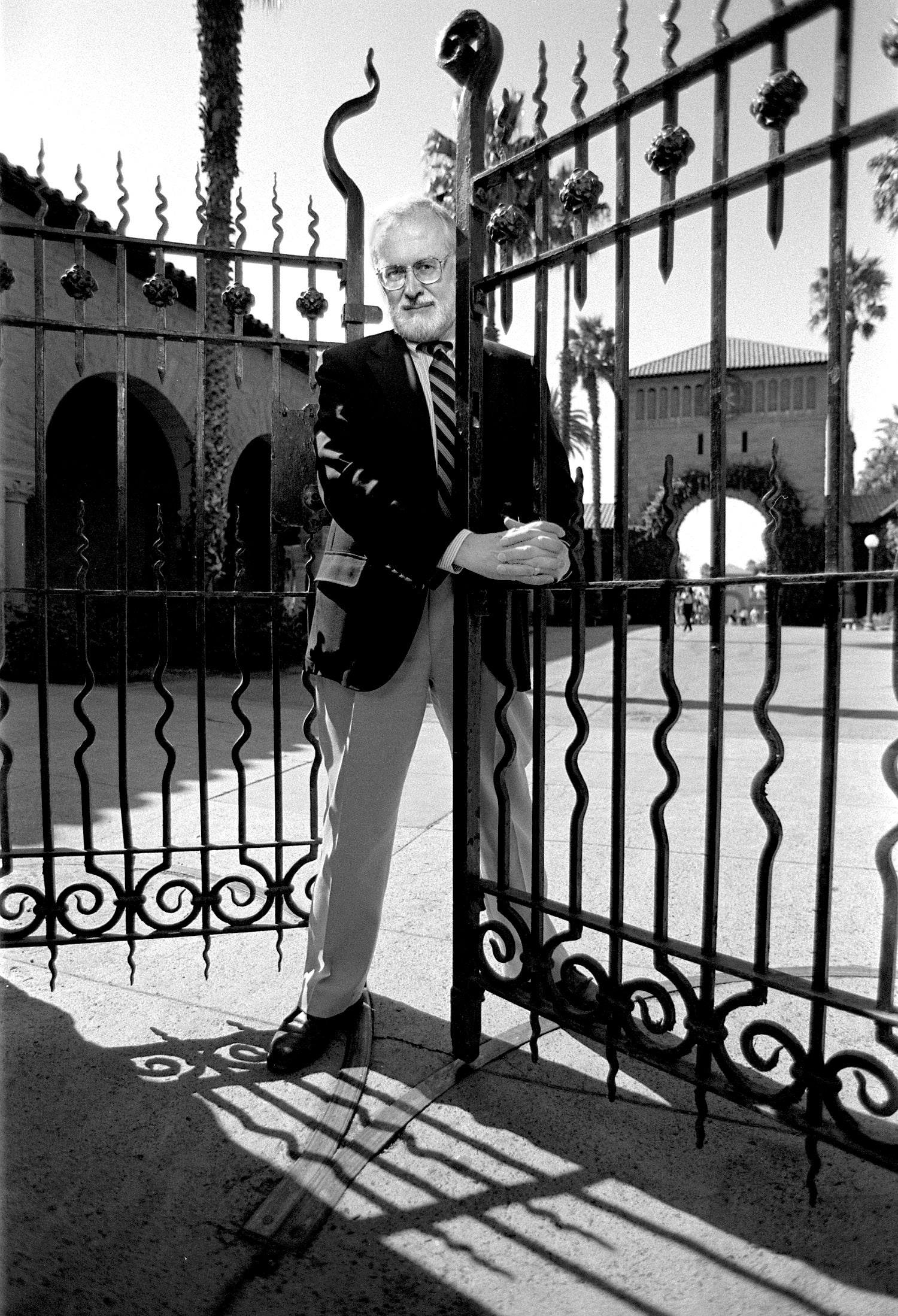John C. L’Heureux, the Lane Professor of Humanities, Emeritus, and for many years leader of the Wallace Stegner Creative Writing Fellowship program at Stanford University, died at his home on April 22. He was 84 years old.
As a writer, L’Heureux penned some 20 volumes of fiction and poetry, had works published in the Atlantic Monthly, Esquire, Harper’s and The New Yorker (most recently in October 2018), and was anthologized in the Best American Stories and Prize Stories: The O. Henry Awards, among many others.
As a professor, L’Heureux is remembered by the students who knew him best as an erudite and giving teacher. He directed the highly regarded Creative Writing Program and directed the Wallace Stegner Creative Writing Fellowship program for years, where his proteges included, among many others, National Medal of Arts recipient Tobias Wolff, Harriet Doerr and Ron Hansen.
L’Heureux noted in his academic biography that he was a “tireless, inspiring teacher utterly committed to his vocation” and was proud to be twice named winner of the Stanford Humanities & Sciences Dean’s Award for Excellence in Teaching.
Eavan Boland, the Bella Mabury and Eloise Mabury Knapp Professor in Humanities, who now serves as the Melvin and Bill Lane Professor and Director of the Creative Writing Program, noted her predecessor’s felicity with students.
“Out of his own great distinction as a writer came his absolute commitment to the talent of others,” she said. “He had a clear-eyed conviction that the hardest thing to buy in the world is time for young writers. The stability of Creative Writing at Stanford, to this day, shows how solid, patient and generous his efforts were. It gives us all great satisfaction to think of some young writer in a room, struggling with their work. Needing an extra hour, an extra week, an extra year. They have it because of John.”
Harriet Doerr, a National Book Award winner, described his influence in the San Jose Mercury News West magazine in 1996.
“John never helped write one single word, but he helped with his criticism tremendously,” Doerr said. “It’s like opening a slit of light in a dark place you hadn’t seen.”
L’Heureux was raised in South Hadley, Massachusetts, the son of an engineer father and a mother who was a secretary. He was educated at public schools and attended Holy Cross College for two years. He then entered the Jesuit order, where he was ordained. He found religious life “extremely difficult,” however, but nonetheless remained a priest for 17 years before requesting and receiving laicization in 1971. He said he felt no regret about leaving the priesthood.
He married Joan Polston that same year and began teaching creative writing at Tufts and Harvard, before settling into a long tenure in 1973 at Stanford, the institution to which he is inseparably associated.
His first novel, Tight White Collar, was published in 1972. At Stanford, L’Heureux focused more intently on novels, which slowly turned away from explorations of “ultimates” in favor of “more mundane grounds” such as academe, marriage and self-delusion. In 1997’s The Handmaid of Desire he put on a satire about an English department at an unnamed university perched under “lion-colored foothills” and approached by an “long avenue of palm trees.” Few failed to recognize the setting. Another novel, The Shrine Altamira, from 1992, was translated into Spanish and German.
While L’Heureux may have left the priesthood, the priesthood never left him. Spirituality and morality were lifelong themes in his writing. Even while still a Jesuit, L’Heureux published several volumes of poetry and worked as an editor at The Atlantic Monthly. He then transitioned to short fiction and, eventually, novels. His subjects included, by his own account, the exorcism of anger, desire, desperation and love, but always lurking were religious undertones such as coping with God and “exploring the mysterious and ironic interventions of God in human affairs,” as he put it.
L’Heureux twice received writing fellowships from the National Endowment for the Arts and, in 2006, a Guggenheim grant to research his novel The Medici Boy. In his author’s biography, L’Heureux claims to have written another novel, Lies, to be published posthumously, “if it’s not destroyed before then.”
John Clarke L’Heureux was born Oct. 26, 1934, in South Hadley, Massachusetts. He earned his bachelor’s degree and doctorate in philosophy at Weston College in 1959 and 1960, respectively; his master’s degrees in philosophy and English in 1960 and 1963 at Boston College; his STL (Licentiate of Sacred Theology) at Woodstock College in 1967; and earned, but did not apply for, a master’s degree in English at Harvard University.
He is survived by his wife of nearly 50 years, Joan Polston L’Heureux, of Stanford.
The memorial Mass will be held at St. Albert the Great Church in Palo Alto on May 25 at 10 a.m., followed by a reception. In lieu of flowers, the family requests donations be made in the name of John Clarke L’Heureux to the charity of one’s choice.
Media Contacts
Joy Leighton, School of Humanities & Sciences: (650) 721-5711, joy.leighton@stanford.edu
